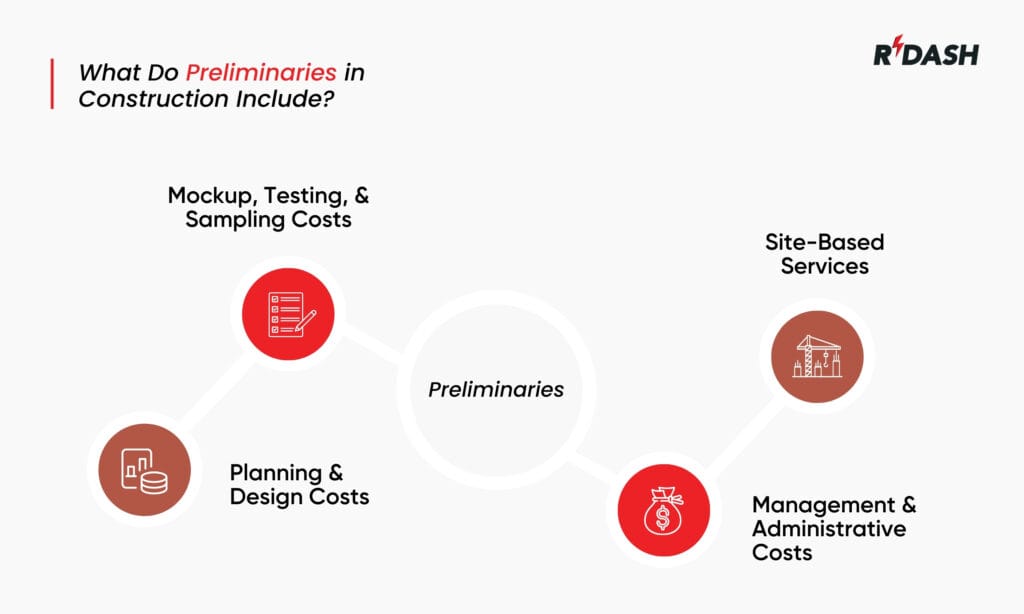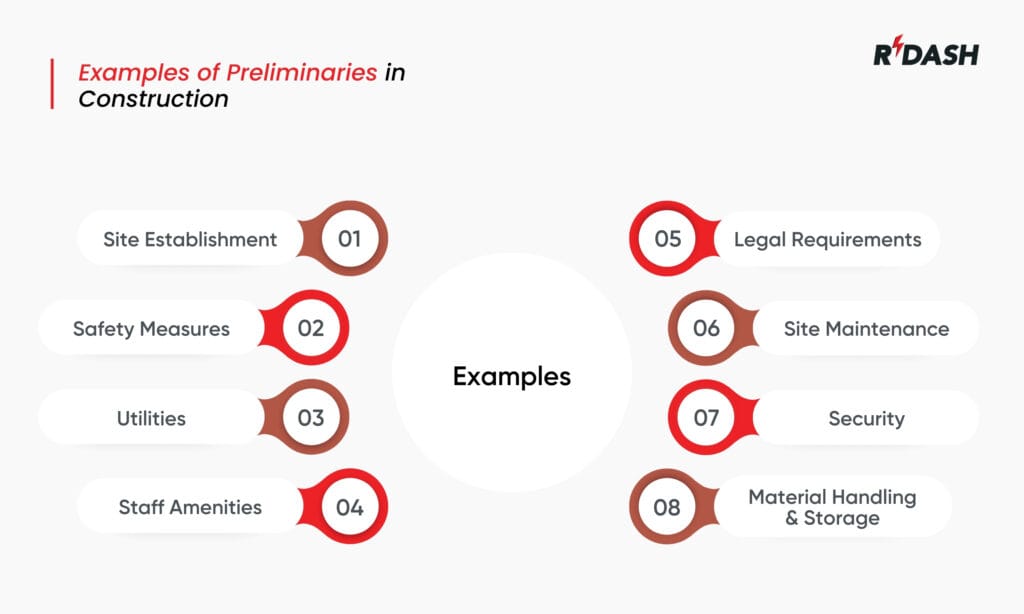What are preliminaries in construction?
In the world of construction, preliminaries, or “prelims,” act as the groundwork for all the major building activities that will follow. They encompass all the preparatory and supportive tasks necessary to facilitate the smooth execution of a construction project. These are the crucial steps that need to be taken before the real action begins, setting the stage for a successful build.
What do preliminaries in construction include?

- Planning and Design Costs: This is where every construction project begins. It involves everything from architectural designs to engineering blueprints and environmental assessments. These costs ensure that the project plans are not only feasible but also optimized for cost-efficiency and compliance with local regulations. This stage often involves multiple revisions and approvals to ensure that every detail is perfect before moving forward.
- Mockup, Testing, and Sampling Costs: Precision is key in construction, and this is achieved through rigorous testing and sampling. Whether it’s testing soil to assess its bearing capacity or creating mockups of building elements to evaluate aesthetic and functional aspects, these activities help mitigate risks and foresee potential issues. This proactive approach saves time and money by addressing problems before construction begins in earnest.
- Management and Administrative Costs: The logistical ballet that is construction management involves detailed scheduling, procurement of materials, hiring subcontractors, and continuous quality control. Administrative tasks also cover regulatory compliance, such as securing permits, handling inspections, and ensuring all legal requirements are met. These management activities are critical as they coordinate all project elements, keeping the construction timeline on track and within budget.
- Site-Based Services: Imagine these as the life support systems of a construction site. They include temporary facilities like site offices, canteens for workers, storage areas, and even the installation of safety signage and equipment. These services also cover the logistical aspects of managing a site, such as access roads, water supply, and power installations, ensuring that the site runs smoothly and safely day in and day out.
Who calculates the preliminaries in construction projects?
The responsibility of calculating prelims usually falls on the shoulders of the general contractor (GC). The GC’s broad overview and intricate knowledge of the construction process equip them well to estimate what will be needed in terms of manpower, materials, and time. However, because the estimation process is complex and requires a high level of accuracy, GCs often enlist the expertise of a quantity surveyor or a cost estimator.
These professionals specialize in cost forecasting and financial management in construction. Using their sharp analytical skills and detailed industry knowledge, they help pinpoint the cost of every aspect of the preliminaries. Their work ensures that the project budget is realistic and comprehensive, thereby minimizing the risk of overruns and ensuring financial efficiency. By providing these estimates and financial advice, they help optimize the allocation of resources throughout the construction project.
Ultimately, the thorough planning and execution of preliminaries are what enable a construction project to proceed smoothly. They lay the foundation not only for the physical building but also for a well-managed, timely, and cost-effective project completion. By understanding and correctly implementing these preliminary steps, construction professionals can pave the way for successful project outcomes from start to finish.
Usual percentage of preliminaries in construction contracts
When it comes to construction projects, the preliminaries or prelims, as they’re affectionately known in the industry can seem like just another line item on the budget. However, they play a pivotal role in the smooth execution of a project. Typically, preliminaries account for around 5% to 15% of the total project cost, though this can vary significantly based on the complexity and duration of the project. This percentage is critical as it covers the essential groundwork and operational support needed throughout the construction phase.
Examples of preliminaries in construction
To give you a better sense of what falls under preliminaries in construction, here’s a breakdown of some common examples:

- Site Establishment: This includes setting up temporary offices, storage facilities, and securing the site.
- Safety Measures: Implementation of health and safety protocols, including signage, barriers, and safety equipment.
- Utilities: Provision of water, electricity, and other necessary services for the construction site.
- Staff Amenities: Facilities for staff welfare, such as rest areas and toilets.
- Legal Requirements: Costs associated with ensuring compliance with local regulations and obtaining necessary permits.
- Site Maintenance: Regular cleaning and upkeep of the site.
- Security: Measures to secure the site, particularly in urban areas or overnight.
- Material Handling and Storage: Equipment and processes to receive, store, and protect materials on site.
Importance of preliminaries in construction
The importance of preliminaries in a construction project cannot be overstated. They ensure that the construction site is well-prepared and safe for workers and the public, which helps in preventing delays and accidents. Effective management of preliminaries can lead to better efficiency and productivity, as it ensures that all necessary supports are in place for the core construction activities to proceed without a hitch. Moreover, preliminaries are also pivotal in managing the environmental impact of a construction project, ensuring that all operations are conducted responsibly.
Preliminaries vs. Preambles
While preliminaries refer to the costs and activities needed to prepare and manage a construction site, preambles in a construction contract serve a different purpose. Preambles are typically sections in the contract documents that define terms, set out the scope of work, and provide legal contexts. They lay the groundwork for interpreting the contract itself, rather than the physical construction site.
In essence, while preliminaries are concerned with the practical aspects of getting a project off the ground, preambles are more about setting the stage legally and administratively for what is agreed upon in the contract. Both are crucial for the success of a construction project but operate in different domains-one in the field and one in the paperwork.
Understanding both aspects – preliminaries and preambles is crucial for anyone involved in construction, as they collectively influence the execution and legal grounding of a project. By comprehending their roles and managing them effectively, construction professionals can ensure smoother project execution and mitigate potential risks and misunderstandings.






